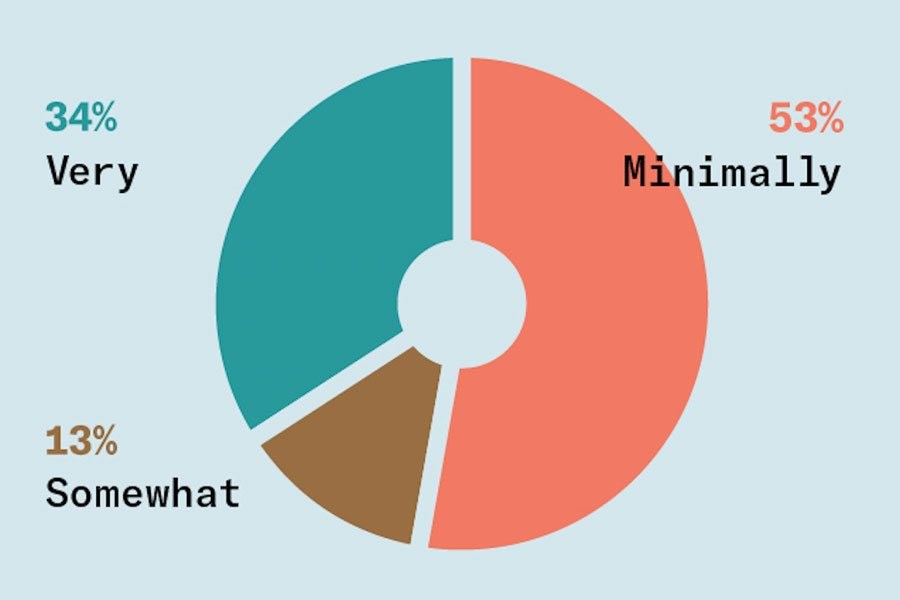As the backbone of any education system, educators are crucial to ensuring the success of students. However, many schools often overlook the importance of educators' morale, leading to hidden costs that can negatively impact both the educators and the students they teach.
According to Philadelphia magazine survey report, 53% of the teachers are just minimally happy with their job, which seems quite alarming and it shows Educators' Poor Morale as well.

Ignoring morale can lead to high turnover rates, decreased productivity, and a lack of innovation in the classroom. Teachers who feel unsupported and undervalued are also more likely to experience burnout, which can ultimately lead to a decline in the quality of education.
In this blog, we will explore the hidden costs of ignoring Educators' Poor Morale in schools, and provide actionable steps that educational leaders can take to address this critical issue. By prioritizing the well-being of educators, we can create a more positive and effective learning environment for students, teachers, and the entire school community.
What is morale in education?
Morale in education refers to the overall sense of well-being, job satisfaction, and motivation that educators experience in their work. It includes feelings of support, respect, and appreciation from colleagues, administrators, and the broader school community.
Educators with high morale are more likely to be engaged in their work, collaborate with others, and be open to new ideas and approaches. In contrast, low morale can lead to feelings of frustration, cynicism, and disengagement, which can negatively impact the quality of education for students.
The impact of low morale in educators
Educators' Poor Morale can have a significant impact on the quality of education and the well-being of students. Research has shown that teachers with low morale are more likely to experience burnout, which can lead to a decline in their instructional practices and effectiveness in the classroom.
Burnout can also lead to high turnover rates, which can be costly for schools in terms of recruitment and training. In addition, educators with low morale may be less likely to collaborate with colleagues, share ideas and resources, and engage in professional development opportunities, which can stifle innovation and growth in the classroom.
Hidden costs of low morale in education
The hidden costs of low morale in education can be significant and far-reaching. For example, high turnover rates can lead to increased costs for recruitment and training, as well as decreased institutional knowledge and continuity.
Additionally, low morale can result in decreased productivity, as educators may be less engaged and motivated in their work.
This can lead to a decline in the quality of education for students, as well as decreased student achievement and outcomes. Finally, low morale can also have a negative impact on the overall school culture, leading to a lack of collaboration, innovation, and creativity.
Factors that contribute to low morale in education
There are many factors that can contribute to Educators' Poor Morale. For example, inadequate compensation, lack of support from administrators, and a lack of professional development opportunities can all lead to feelings of frustration and disengagement.
Additionally, a lack of autonomy in the classroom, excessive bureaucracy, and a focus on standardized test scores can also contribute to low morale.
A lack of recognition and appreciation for the important work that educators do can make them feel undervalued and unappreciated, leading to Educators' Poor Morale and burnout as well.
How to identify low morale in educators?
Identifying Educators' Poor Morale can be challenging, as it often manifests in subtle ways. However, there are several signs that educational leaders can look out for, including high rates of absenteeism, decreased productivity, and increased turnover rates.
In addition, educators with low morale may be less likely to participate in professional development opportunities, collaborate with colleagues, or engage in innovative practices in the classroom. Finally, educators with low morale may also exhibit signs of burnout, such as decreased engagement and enthusiasm for their work.
Strategies for improving educators' morale
Improving educators' morale requires a multifaceted approach that addresses the root causes of low morale. Some key strategies for improving morale include providing adequate compensation and benefits, offering opportunities for professional development and growth, and fostering a positive and supportive school culture.
In addition, educational leaders can promote autonomy and creativity in the classroom, reduce bureaucracy and administrative burdens, and provide recognition and appreciation for the important work that educators do. Finally, fostering open communication and collaboration between educators, administrators, and the broader school community can help to build trust and support, which can lead to increased morale and engagement.
The benefits of prioritizing educators' morale
Prioritizing educators' morale can have significant benefits for both educators and students. Educators with high morale are more likely to be engaged in their work, collaborate with colleagues, and be open to new ideas and approaches. This can lead to increased innovation and creativity in the classroom, as well as improved student outcomes and achievement.
In addition, high morale can lead to decreased burnout and turnover rates, which can be costly for schools in terms of recruitment and training. Finally, prioritizing educators' morale can help to build a positive and supportive school culture, which can benefit the entire school community.
The role of school leaders in fostering positive morale
Educational leaders play a crucial role in fostering positive morale among educators. They can do this by creating a supportive and positive school culture, promoting autonomy and creativity in the classroom, and providing recognition and appreciation for the important work that educators do.
In addition, educational leaders can offer opportunities for professional development and growth, reduce bureaucracy and administrative burdens, and foster open communication and collaboration between educators, administrators, and the broader school community.
By prioritizing educators' morale, educational leaders can create a more positive and effective learning environment for students, teachers, and the entire school community.
The importance of valuing education’s morale for student's success:
The hidden costs of ignoring Educators' Poor Morale in schools can have significant and far-reaching impacts on both educators and students. Low morale can lead to high turnover rates, decreased productivity, and a lack of innovation in the classroom. It can also lead to burnout, which can ultimately lead to a decline in the quality of education.
By prioritizing the well-being of educators, educational leaders can create a more positive and effective learning environment for students, teachers, and the entire school community. By providing adequate compensation and benefits, offering opportunities for professional development and growth, and fostering a positive and supportive school culture, educators can be empowered to do their best work and provide the best possible education for students.









